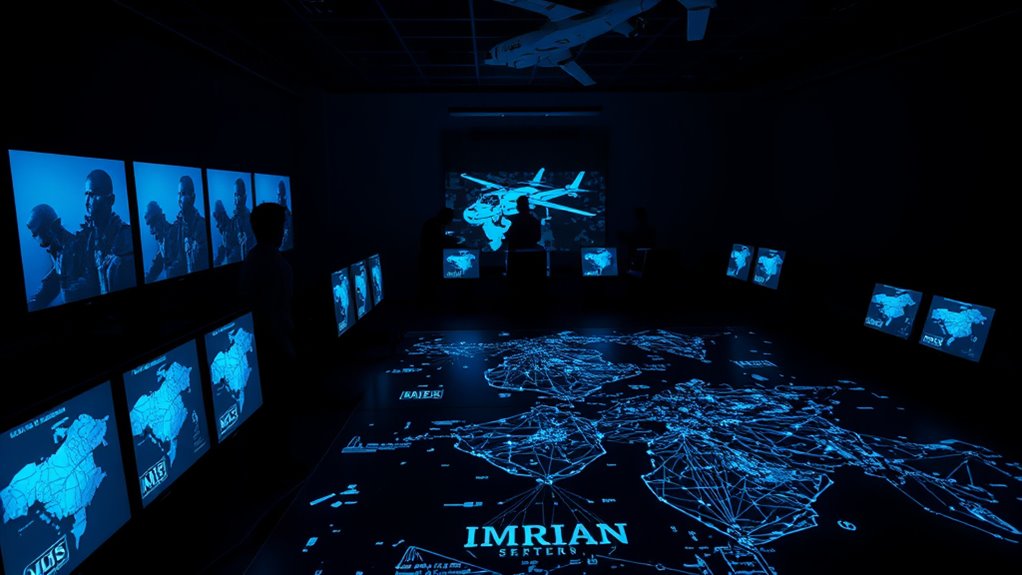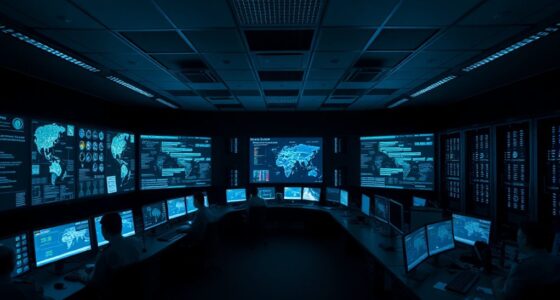Iran's MOIS uses AI to boost intelligence operations and enhance military capabilities. It analyzes vast amounts of data to predict threats and manage surveillance of dissidents. AI-driven technology improves targeting precision in operations and strengthens cyber strategies, allowing Iran to wield powerful propaganda tools. By collaborating with allies like Russia and China, MOIS expands its reach and effectiveness. Discover how these advancements shape Iran's strategic landscape and influence regional dynamics further.
Key Takeaways
- AI enhances MOIS's intelligence capabilities by analyzing vast data sets to predict threats and enemy movements effectively.
- The integration of AI in cyber warfare allows MOIS to create advanced propaganda and conduct sophisticated cyber operations.
- Autonomous AI systems improve decision-making in military operations, optimizing the Revolutionary Guard's strategic responses to threats.
- Collaboration with international partners like Russia and China boosts MOIS's AI proficiency, strengthening its operational reach and cyber capabilities.
- AI-driven surveillance technologies enable MOIS to maintain social control and track dissidents, reinforcing the regime's grip on power.
The Role of MOIS in Iran's Intelligence Framework
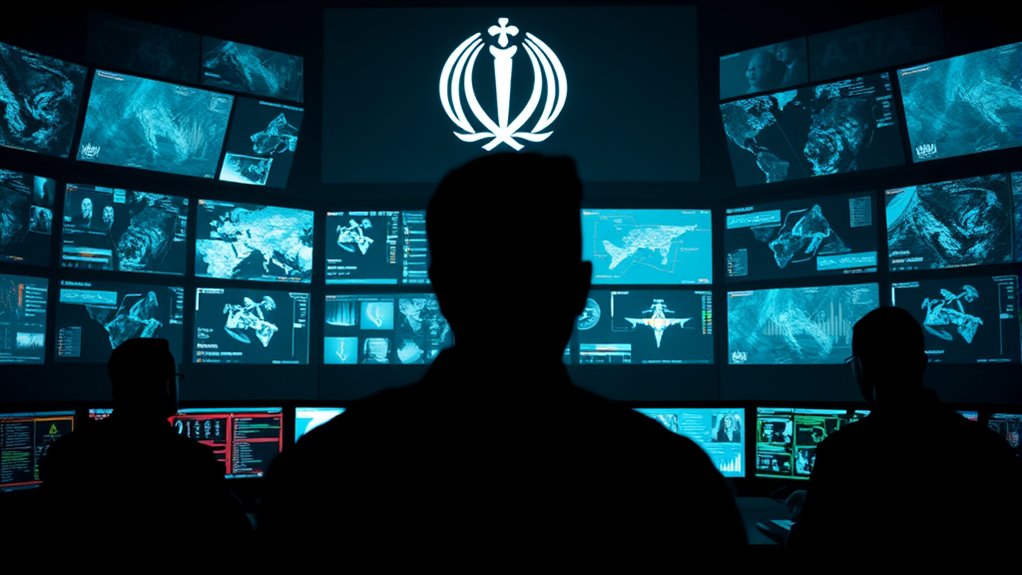
While many might think of the Islamic Revolutionary Guard Corps (IRGC) as Iran's primary intelligence force, the Ministry of Intelligence and Security (MOIS) plays a crucial role in the country's intelligence framework.
Operating both inside and outside Iran, MOIS functions autonomously under the Supreme Leader's oversight, sidestepping cabinet and parliamentary scrutiny. It collects and analyzes intelligence, tackling threats like espionage and subversion. The agency has been involved in over 450 terrorist attacks abroad since the 1980s, demonstrating its extensive reach.
MOIS also conducts covert operations against dissident groups and engages in psychological warfare through its Department of Disinformation. Collaborating with the IRGC's Quds Force, it shares vital information with other agencies.
MOIS undertakes covert operations against dissenters and engages in psychological warfare, collaborating closely with the IRGC's Quds Force.
With over 30,000 members, MOIS remains a formidable player, employing both traditional and cyber capabilities to safeguard Iran's national interests.
AI Integration in Military Operations
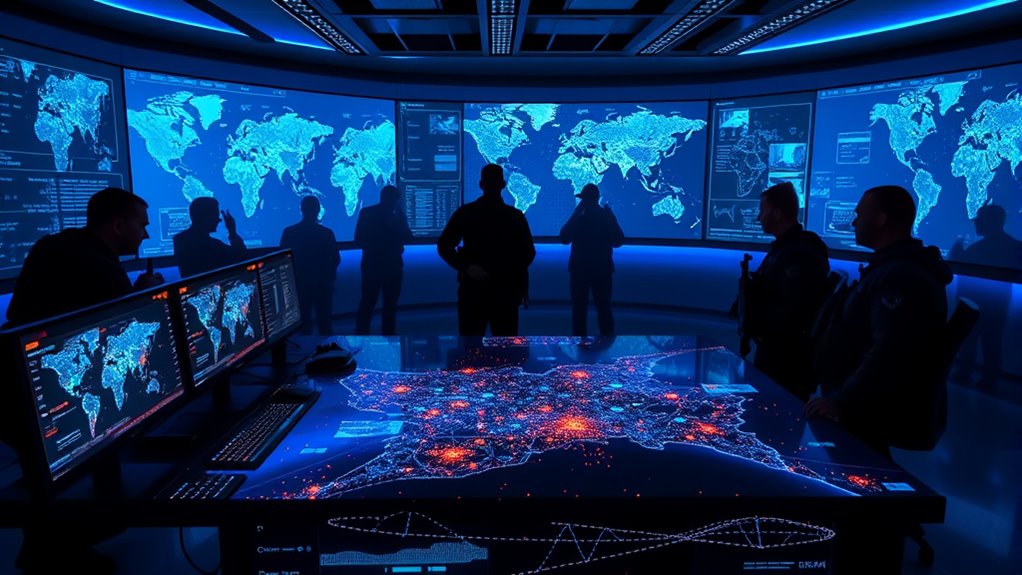
MOIS's intelligence capabilities are increasingly complemented by the integration of artificial intelligence (AI) into military operations.
You'll see how AI enhances decision-making by analyzing vast data sets, predicting enemy movements, and optimizing strategies. Autonomous systems like AI-powered drones operate independently, making real-time decisions based on sensor inputs.
Moreover, AI processes data from satellite imagery and electronic communications to identify potential threats. Through predictive analytics, it anticipates insurgent attacks and uncovers patterns in terrorist activities. AI enhances autonomous operation of unmanned vehicles and synthesizes sensor data into actionable intelligence.
Smart munitions navigate and detect targets more effectively, while AI-enhanced drones improve precision.
AI's role in command and control systems fosters adaptability, enabling better situational awareness and collaboration in mission planning.
Cyber Warfare and AI Capabilities
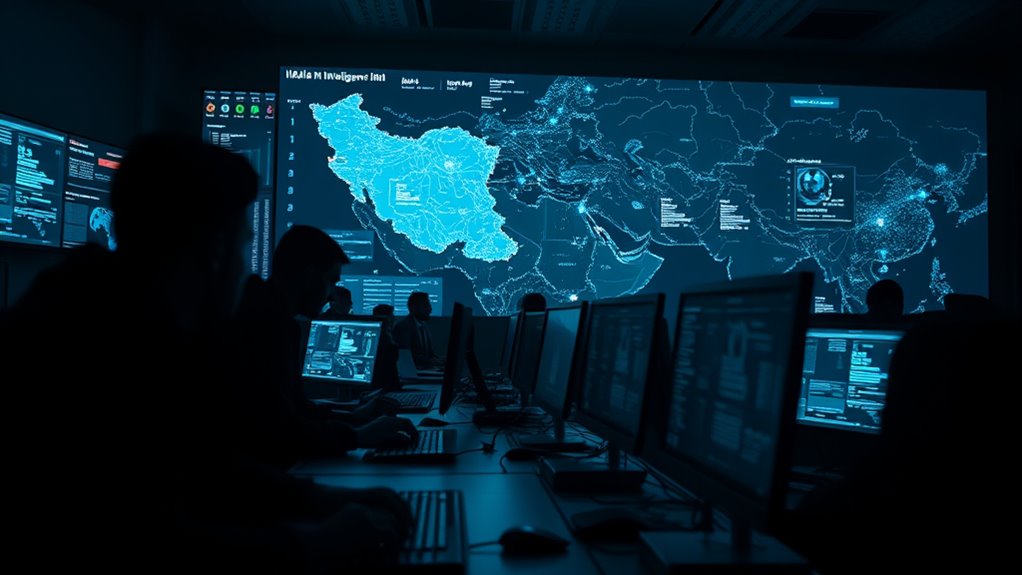
As Iran ramps up its cyber warfare capabilities, the integration of artificial intelligence (AI) plays a pivotal role in enhancing the sophistication and efficiency of its operations. You'll see how AI strengthens Iranian cyber strategies, enabling the creation of deepfakes and personalized propaganda that influence public opinion. Collaborating with nations like Russia and China, Iran leverages advanced AI technologies to develop cyber proxies, allowing it to project power without direct confrontation. This hybrid approach maintains plausible deniability while escalating threats to global security. Furthermore, Iran's collaboration with China enhances its AI capabilities, providing access to cutting-edge technologies that bolster its cyber operations. AI-driven information operations streamline tactics, increasing the effectiveness of cyber attacks. As these capabilities evolve, they significantly shape regional dynamics and challenge traditional security paradigms.
Surveillance and Social Control Mechanisms
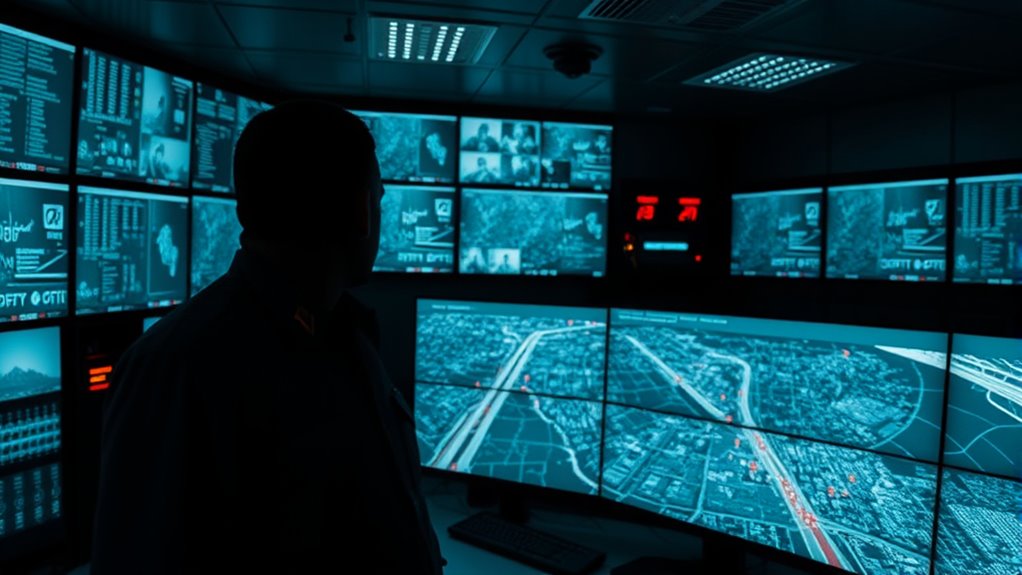
In an effort to maintain its grip on power, the Iranian Ministry of Intelligence and Security (MOIS) employs extensive surveillance and social control mechanisms to monitor both domestic and international threats. You'll find that MOIS conducts domestic surveillance to identify regime opponents while also tracking anti-regime activists abroad through its embassies. Utilizing various technological methods, they infiltrate opposition groups, gathering and analyzing vital intelligence. Additionally, their tactics include using Iranian cyber actors to execute espionage efforts against perceived threats. Social control is enforced through psychological warfare and infiltration of dissident organizations. They monitor and arrest members of these groups, often employing severe interrogation methods. With a constitutional mandate to share intelligence, MOIS collaborates with other agencies, ensuring a tight grip on dissent and maintaining a pervasive atmosphere of fear among citizens.
International Partnerships and Technology Transfer
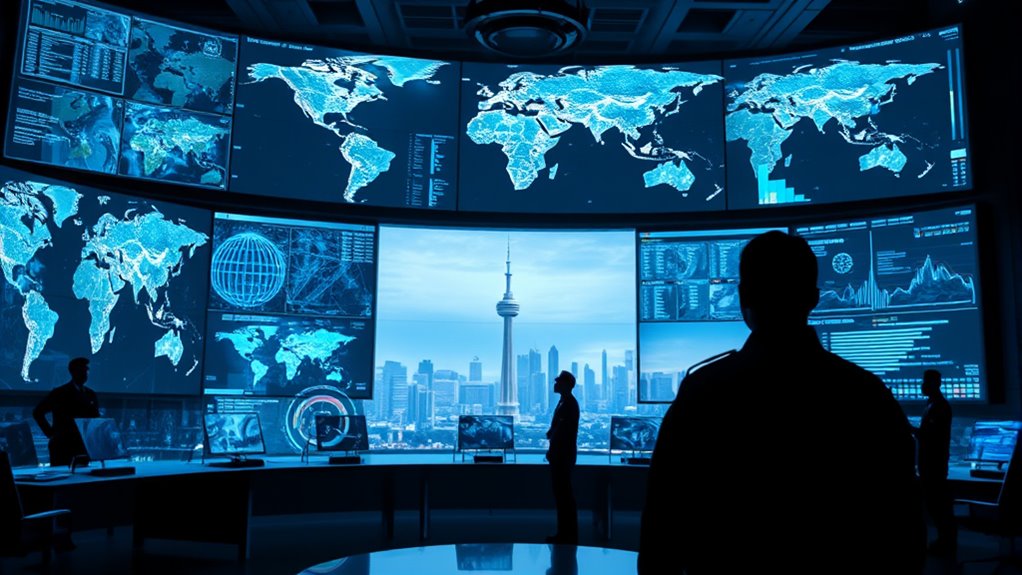
While Iran continues to enhance its AI capabilities, it actively seeks international partnerships and technology transfer to bolster its advancements. Collaborations with countries like Russia and China pave the way for ethical AI development and infrastructure improvement. The 25-year agreement with China, for instance, enables thousands of Iranian students to contribute to AI progress. Iran's investment in AI research and its establishment of regional AI hubs reflect a commitment to fostering innovation. Moreover, reverse engineering technologies, such as drones, further informs AI strategies. Through training programs and data sharing, Iran aims to develop a robust AI workforce while prioritizing cybersecurity. These partnerships not only strengthen Iran's technological landscape but also position it as a key player in regional AI initiatives. Furthermore, Iran's second position for the number of AI developers in the region underscores its growing importance in the global AI ecosystem.
Future Prospects for AI in Military and Intelligence Operations
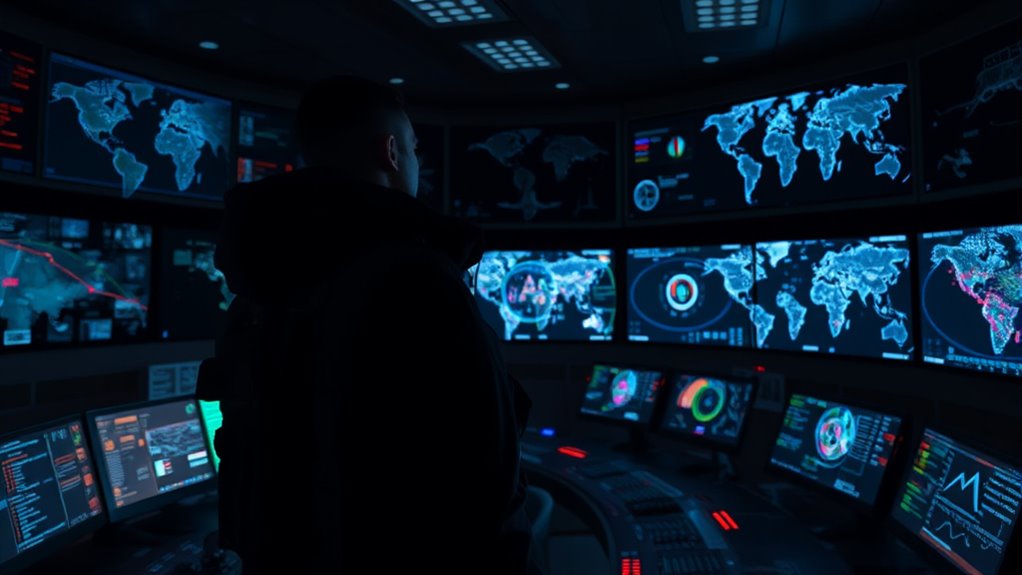
With the rapid evolution of AI technologies, military and intelligence operations are poised for significant transformation. You'll see enhanced precision in targeting capabilities, allowing drones and missile systems to operate more effectively. Autonomous systems will increase operational efficiency while minimizing human risk. AI's ability to process vast data enables swift decision-making and improved situational awareness, crucial for modern warfare. Moreover, AI's role in cybersecurity will strengthen military networks against emerging threats. As you look ahead, expect increased funding and advancements in neural networks and machine learning, driving innovations in mission planning and autonomous decision-making. These developments won't only enhance current capabilities but also pave the way for adaptive strategies, ensuring military forces stay ahead of evolving enemy tactics. Furthermore, the rapid incorporation of AI tools in military operations is likely to reshape the battlefield landscape.
Frequently Asked Questions
What Specific AI Technologies Does MOIS Currently Utilize?
You'll find that the Ministry of Intelligence and Security (MOIS) utilizes various AI technologies to enhance its operations.
They employ AI-powered surveillance systems to monitor activities and gather intelligence.
They also use AI-driven data analysis tools to process vast amounts of information quickly.
Additionally, AI aids in social media monitoring to track public sentiment and disinformation campaigns.
These technologies significantly improve their ability to assess threats and respond effectively.
How Does AI Affect Mois's Decision-Making Processes?
Imagine if decision-making was as easy as flipping a coin—well, AI's changing that game! It helps you analyze heaps of data in seconds, spotting patterns and providing real-time insights.
You've got automated processes that cut down errors and boost accuracy. Plus, AI's like that overachieving friend who's always on, ensuring your decisions are consistent and data-driven.
What Are the Ethical Implications of Mois's AI Usage?
When you consider the ethical implications of AI usage, you'll notice significant concerns about privacy violations, especially in authoritarian contexts.
AI can perpetuate biases, leading to discrimination and human rights abuses. It often lacks transparency, making its decision-making processes difficult to scrutinize.
Furthermore, AI can manipulate public opinion through propaganda, raising alarms about its role in suppressing dissent and undermining democratic values.
You'll find these issues critical to addressing AI's impact on society.
Who Oversees AI Development Within the MOIS?
Think of AI development in Iran like a chess game, where strategic moves determine the outcome.
You'll find that the National AI Organization, established in July 2024, oversees AI development. This organization operates under the president's supervision, ensuring that AI integration aligns with national goals.
As it navigates this complex landscape, it aims to enhance various sectors, from governance to military applications, positioning Iran competitively in the global AI arena.
How Can Civilians Protect Themselves From AI Surveillance by MOIS?
To protect yourself from AI surveillance, start by minimizing your personal data exposure online.
Use encrypted communication tools to secure your messages.
Stay aware of the surveillance technologies around you, and advocate for privacy rights to challenge intrusive laws.
Consider employing technological countermeasures that block or disguise your data.
Conclusion
So, as Iran's MOIS cozies up to AI, it seems the future of intelligence is all about algorithms and surveillance. Who needs human intuition when you can have a machine that can predict your every move? With their revolutionary gadgetry, the Revolutionary Guard might just become the world's most high-tech babysitters. Let's hope they're not taking notes on our every tweet. After all, privacy is so last season, right? Welcome to the brave new world of intelligent oversight!
